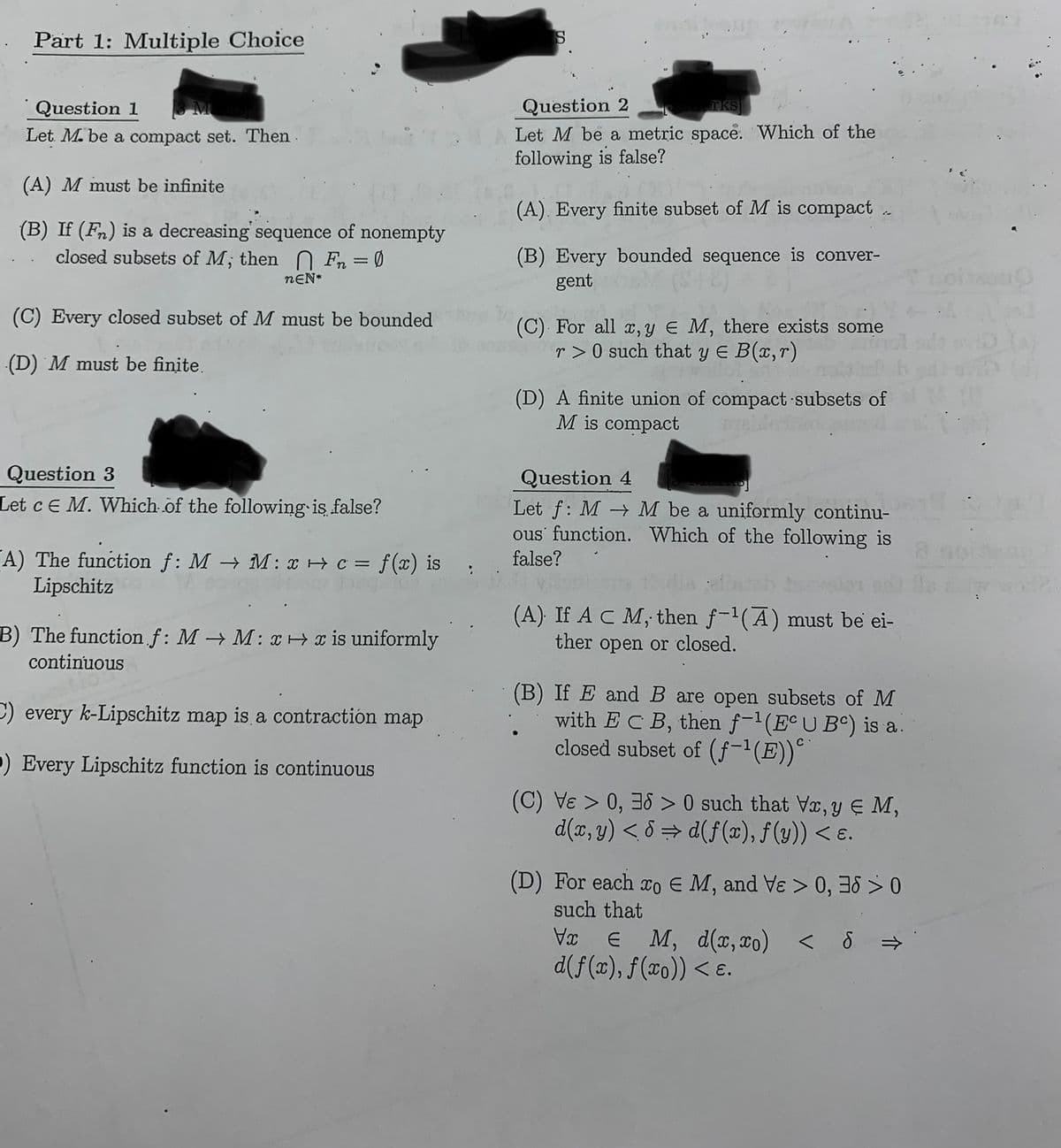Question 1 Let M. be a compact set. Then. (A) M must be infinite (B) If (Fn) is a decreasing sequence of nonempty closed subsets of M; then Fn = 0 nEN* (C) Every closed subset of M must be bounded (D) M must be finite.
Question 1 Let M. be a compact set. Then. (A) M must be infinite (B) If (Fn) is a decreasing sequence of nonempty closed subsets of M; then Fn = 0 nEN* (C) Every closed subset of M must be bounded (D) M must be finite.
Elements Of Modern Algebra
8th Edition
ISBN:9781285463230
Author:Gilbert, Linda, Jimmie
Publisher:Gilbert, Linda, Jimmie
Chapter1: Fundamentals
Section1.7: Relations
Problem 13E: 13. Consider the set of all nonempty subsets of . Determine whether the given relation on is...
Related questions
Question

Transcribed Image Text:Part 1: Multiple Choice
Question 1
Let. M. be a compact set. Then
(A) M must be infinite
(B) If (Fn) is a decreasing sequence of nonempty
closed subsets of M; then Fn = 0
nEN*
(C) Every closed subset of M must be bounded
(D) M must be finite.
Question 3
Let c E M. Which of the following is false?
A) The function f: M → M: x + c = f(x) is false?
Lipschitz
B) The function.f: M→M: x x is uniformly
continuous
C) every k-Lipschitz map is a contraction map
P) Every Lipschitz function is continuous
S
Question 2
rks
Let M be a metric space. Which of the
following is false?
(A). Every finite subset of M is compact
(B) Every bounded sequence is conver-
gent
(C) For all x, y € M, there exists some
r>0 such that y = B(x,r)
(D) A finite union of compact subsets of
M is compact
Question 4
Let f: MM be a uniformly continu-
ous function. Which of the following is
(A) If A C M, then f-¹(A) must be ei-
ther open or closed.
(B) If E and B are open subsets of M
with ECB, then f−¹(Eª U Bº) is a.
closed subset of (f-¹(E))º`
(C) V > 0, 36> 0 such that Vx, y ≤ M,
d(x, y)<8⇒d(f(x), f(y)) < e.
(D) For each co E M, and Ve > 0, 3
such that
Vx
€ M, d(x,xo) < S
d(f(x), f(xo)) < e.
Expert Solution
This question has been solved!
Explore an expertly crafted, step-by-step solution for a thorough understanding of key concepts.
Step by step
Solved in 2 steps

Recommended textbooks for you

Elements Of Modern Algebra
Algebra
ISBN:
9781285463230
Author:
Gilbert, Linda, Jimmie
Publisher:
Cengage Learning,

Algebra & Trigonometry with Analytic Geometry
Algebra
ISBN:
9781133382119
Author:
Swokowski
Publisher:
Cengage

Linear Algebra: A Modern Introduction
Algebra
ISBN:
9781285463247
Author:
David Poole
Publisher:
Cengage Learning

Elements Of Modern Algebra
Algebra
ISBN:
9781285463230
Author:
Gilbert, Linda, Jimmie
Publisher:
Cengage Learning,

Algebra & Trigonometry with Analytic Geometry
Algebra
ISBN:
9781133382119
Author:
Swokowski
Publisher:
Cengage

Linear Algebra: A Modern Introduction
Algebra
ISBN:
9781285463247
Author:
David Poole
Publisher:
Cengage Learning

Elementary Linear Algebra (MindTap Course List)
Algebra
ISBN:
9781305658004
Author:
Ron Larson
Publisher:
Cengage Learning